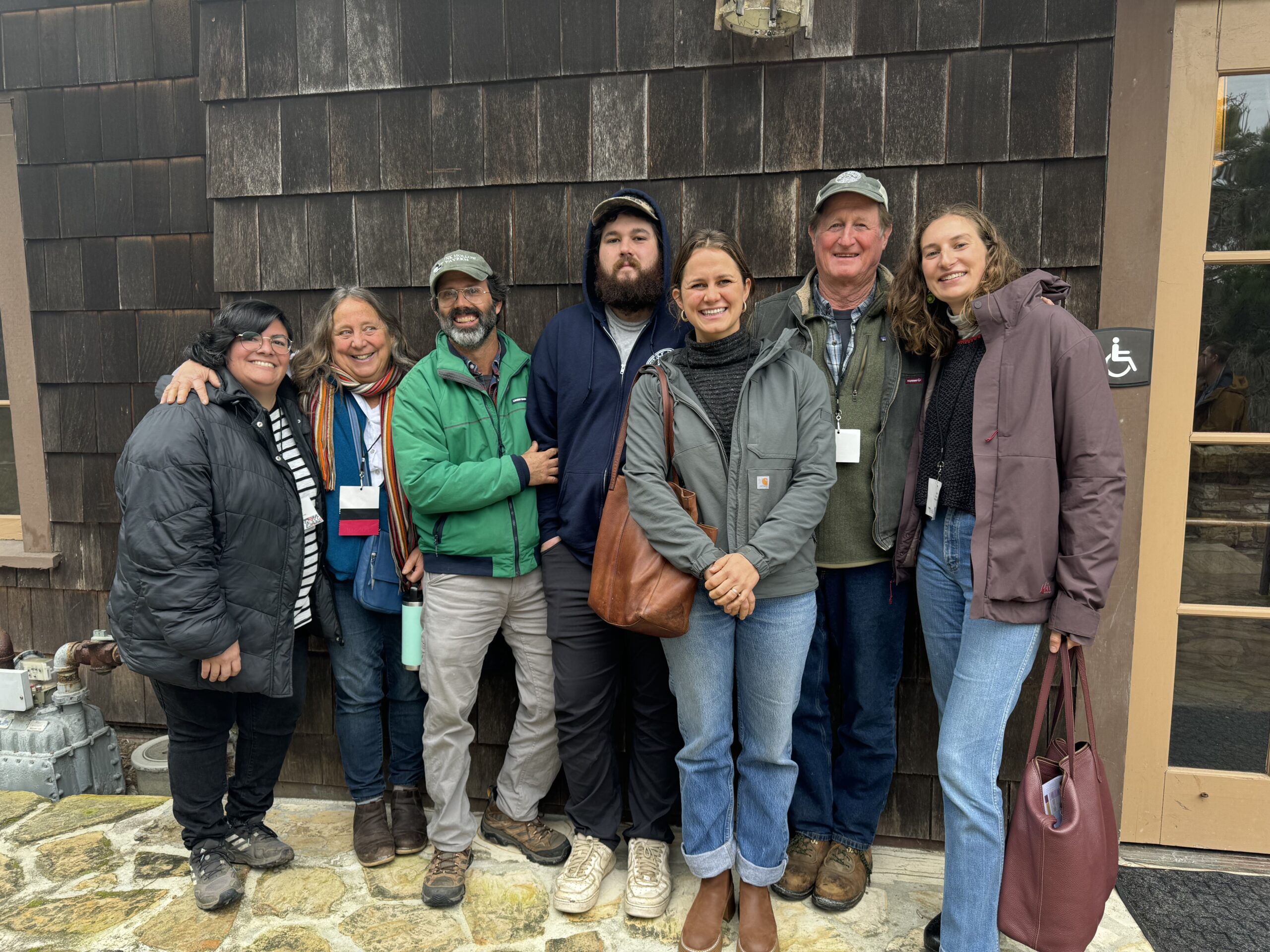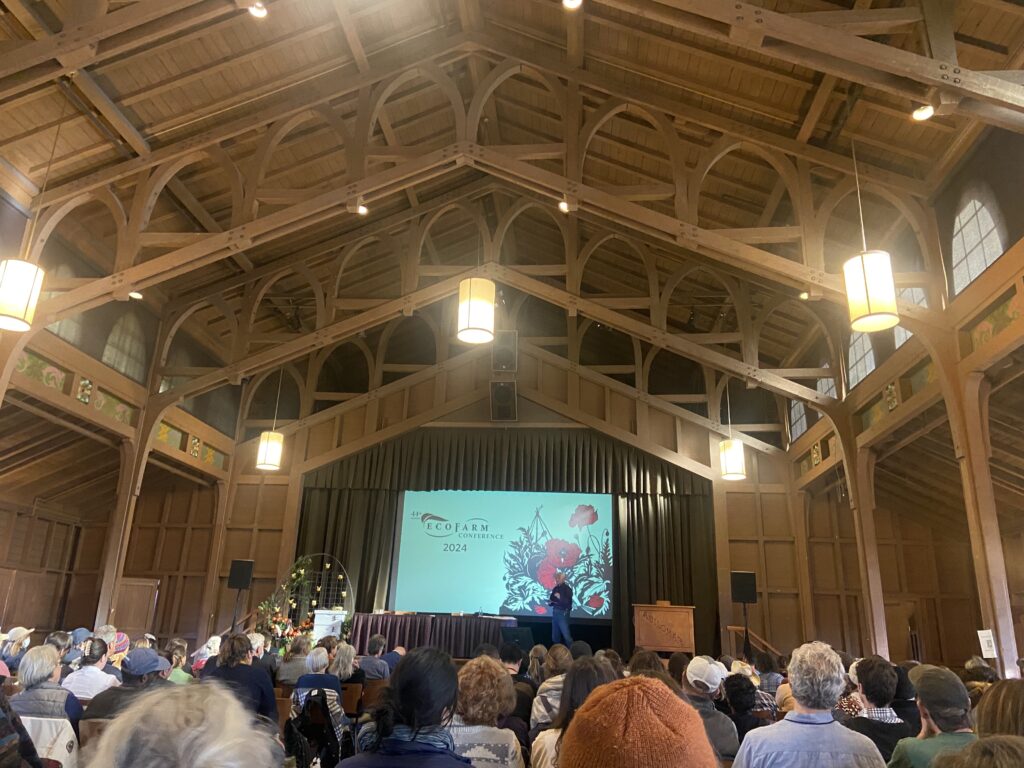
For the past 44 years Dru and I, Andrew, Judith, and others from the farm have been attending the EcoFarm Conference, a gathering of farmers, activists and researchers probing the potentials of organic and biologically-driven food and farming systems. Our participation started with a first gathering of farmers in the shade of a large walnut tree in Winters in 1981. At that time organic farming was an idea, seen by many as farming heresy. We were probing the possibilities of eliminating synthetic fertilizers, herbicides, and pesticides from our food and farming ecosystems. Experts dismissed organic agriculture as an irresponsible path to world starvation.
Full Belly has worked with many other early ecologically-minded farmers to shepherd the growth of our organic community by helping to organize increasingly larger EcoFarm gatherings over the past 44 years. From the first meeting of 12 young farmers, the EcoFarm Conference has grown to an annual gathering of 1,500 farmers, farmworkers, researchers and activists who converge mid-January at Asilomar in Pacific Grove, this year meeting January 17-20. In its early years, Dru was the EcoFarm executive director, organizing conferences out of a small room in our house. She has been on the board for more than 43 years.
Our Hoes Down Festival was conceived by several Capay Valley women to welcome our customers to our farm; walking fields with us, selling dried flower wreaths, building farm kids for a day, and sharing all that was being learned at the Conference and incorporated on our farms. The Hoes Down also grew to hosting nearly 5,000 as a fundraiser aimed at supporting EcoFarm, Community Alliance with Family Farmers, and other non-profit groups. This past year a slimmed down Hoes Down hosted 2,500 people on our farm, raising nearly $130,000 for these good groups and directly supporting this year’s Conference.
Organic farming has grown and blossomed around the world over the past 44 years. Its core principles of an environmentally sound, socially just, and economically fair agriculture resonated across continents. Consumers asked for food security and farmers relearned the practices and social structures to make an aspirational and practical food system.
In many economies around the world, traditional farming systems are being supported with new knowledge of agroecological principles. Organic farming principles moved from a fringe idea to mainstream thinking about right relationships. The long-term solution to world hunger will demand food systems that build the capacity for future production without destroying ecological or social foundations.
Every year, in the three days of gathering and challenging each other, themes emerge that represent the collective leavening of thought in our community. On the farming side-understanding more deeply the interface of biological systems with nitrogen/nutrient cycling in soil. We discussed how biological processes can mediate the conversion of atmospheric nitrogen (78% of the air we breathe) to plant-available nitrogen. We plunged deeper into the impacts of soil tillage and the changes that occur in soil structure and soil life when tillage is not done mindfully. We looked at how plant communities create robust soil microbial communities- diversity begetting more vibrant diversity. These processes impact nutrient complexity in food, insect resistance in plants, reduce nitrogen leaching from soil application to groundwater and make healthier food.
On the social side, there is an emphasis at EcoFarm at regenerating the human community of farmers and gardeners, rebuilding places for communities that have been deconstructed, violated, or ignored. There is a focus on inclusion, making places for farmworkers, communities of color, and those who choose to show their humanity in their own unique being. There is conscious work to make pathways and places for their entry into food production. Efforts at inclusion are driven by understanding the beauty and strength of being connected to place, having one’s hands in the earth and the self-reliance and community resilience from growing food.
Support for EcoFarm has allowed Spanish translation for non-English speaking farmworkers to hone their knowledge. The Hoes Down proceeds helped create 40 scholarships for beginning farmers. The Conference begins and ends with an acknowledgement of those who have tenured this land for centuries and have themselves been displaced. Perhaps their knowledge of their right tenure will provide us insight to a native mind – being at one with a whole environment, intrinsic to an incredible dynamic ecosystem over time. May we learn from them about care and rhythms of seasons to create resilient relationships. Perhaps our collective journey will ask that we cultivate that mind in aspiring to a New Nativism built on a seamless interwoven whole of people, place, and all life that can be engendered there.
The EcoFarm has become an important gathering of a far-flung community. The conference is part of our annual journey of discovery and becoming. Thank you for allowing us to be joined to your journey.
-Paul Muller
A friend, Steve Sprinkel, who farms in Ojai, has written up and shared his thoughts on this year’s conference, which you can read here.

